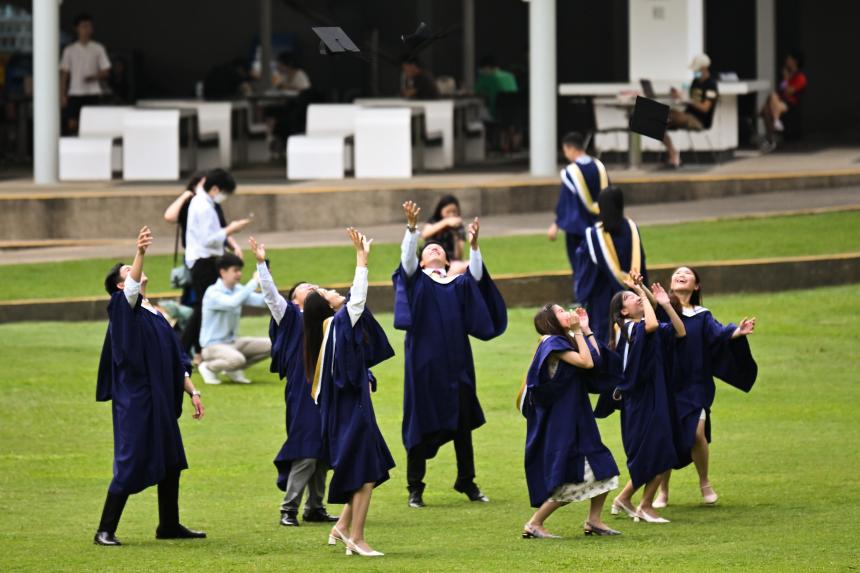SINGAPORE – Fresh university graduates enjoyed higher salaries in 2023 than in the last three years, although fewer of them were able to find full-time, part-time and freelance jobs amid slower economic growth.
The latest graduate employment survey, released on Feb 22, showed that the median gross salaries of fresh graduates rose to $4,313, from $4,200 in 2022.
However, only 84.1 per cent of fresh graduates in the labour force were able to secure full-time permanent roles, compared with 87.5 per cent in 2022.
There were also fewer of them in part-time or temporary work (4 per cent, down from 4.5 per cent in 2022) or doing freelance work (1.5 per cent, down from 1.8 per cent in 2022).
Overall, of the 10,900 graduates in the labour force surveyed, 89.6 per cent found permanent, freelance or part-time jobs within six months of graduating, a drop from 93.8 per cent in 2022.
The figure is about the same for pre-Covid-19 years.
Before the pandemic, from 2017 to 2019, an average of 89.9 per cent of those in the labour force were employed, with 80.4 per cent in full-time permanent roles.
Graduates in the labour force refer to those who are either working, or unemployed but actively looking for a job.
Health sciences, information and digital technologies, and business were the three course clusters that recorded the highest full-time permanent employment rates for graduates in 2023: 95.9 per cent, 88.7 per cent and 88.3 per cent, respectively. These figures represented the percentage of graduates from these sectors who managed to find full-time jobs.
Graduates of information and digital technologies courses continued to take home the highest monthly pay at $5,500, although it is a slight dip from $5,625 in 2022.
Engineering graduates also experienced a drop in median gross monthly salary to $4,500, from $4,600 in 2022.
All other course clusters recorded an increase in the median gross monthly salary for their graduates.
Some 12,300 fresh graduates of full-time programmes in the National University of Singapore, Nanyang Technological University, Singapore Management University and Singapore University of Social Sciences (SUSS) participated in the 2023 survey, representing a response rate of 74 per cent.
They were surveyed by the four universities on their employment status as at Nov 1, 2023, about six months after the completion of their final examinations.
Due to their different academic calendars, the surveys for the Singapore Institute of Technology (SIT) and Singapore University of Technology and Design (SUTD) will be conducted at a later date. The SUTD survey will be conducted in November 2024 and its findings will be reported alongside the graduate employment survey results in 2025, while the SIT survey will be conducted in March 2024 and its results released at a later date.
In 2023, Singapore’s economy grew 1.1 per cent, slowing from the 3.8 per cent expansion in 2022, the Ministry of Trade and Industry said on Feb 15. The figure was below the 1.2 per cent official estimate made in January 2024.
The current decrease in employment levels is not notably impactful, as evidenced by the stability of wages, said Dr David Leong, managing director of PeopleWorldwide Consulting.
“This trend suggests that employers are in a position to select top-tier candidates from the job market. It indicates a competitive environment where quality trumps quantity, allowing companies to prioritise hiring the most qualified individuals within their fields,” Dr Leong said.
He added that the significance of salary and employment figures – though they do serve as key indicators for policymakers, businesses, and consumers about the health of the economy and job market – cannot be overstated, especially in a slow-growing economy.
“Despite the cautiousness, the stability and growth in salaries and employment rates show resilience in the labour market despite broader economic challenges,” Dr Leong said, referring to Singapore’s slow economic growth, adding that the demand for local graduates remains high.
Fresh graduate Eunice Tan, 24, a full-time English language teacher at a Ministry of Education kindergarten, said her job deeply aligns with her passion for children and their development.

Right after she graduated, she worked part-time as a project support staff member at Republic Polytechnic and as an enrichment teacher in a different school, she added, before starting her stint as a kindergarten teacher.
Acknowledging that this is not the typical path taken by most fresh graduates, Ms Tan, who graduated from SUSS with a bachelor’s degree in early childhood education, said: “I just decided to follow my passion; everything else was secondary.”
While she does worry about her career prospects and finances, she believes she has accumulated sufficient experience and skills through her education to help tackle those challenges.


